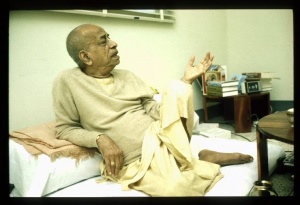CC Antya 6.193 (1975)

A.C. Bhaktivedanta Swami Prabhupada
Below is the 1996 edition text, ready to be substituted with the 1975 one using the compile form.
TEXT 193
- prabhu kahe,—“kṛṣṇa-kṛpā baliṣṭha sabā haite
- tomāre kāḍila viṣaya-viṣṭhā-garta haite“
SYNONYMS
prabhu kahe—Lord Śrī Caitanya Mahāprabhu said; kṛṣṇa-kṛpā—the mercy of Lord Kṛṣṇa; baliṣṭha—more powerful; sabā haite—than anything; tomāre—you; kāḍila—He has delivered; viṣaya—of material enjoyment; viṣṭhā—of stool; garta—the ditch; haite—from.
TRANSLATION
Lord Śrī Caitanya Mahāprabhu said, “The mercy of Lord Kṛṣṇa is stronger than anything else. Therefore the Lord has delivered you from the ditch of materialistic life, which is like a hole into which people pass stool.”
PURPORT
According to the law of karma, everyone is destined to suffer or enjoy according to a certain material standard, but the mercy of Lord Kṛṣṇa is so powerful that the Lord can change all the reactions of one’s past karma, or fruitive activities. Lord Śrī Caitanya Mahāprabhu specifically drew attention to the mercy of Lord Kṛṣṇa. That mercy is more powerful than anything else, for it had saved Raghunātha dāsa from the strong bondage of materialistic life, which the Lord compared to a hole where people pass stool. Śrī Caitanya Mahāprabhu gave His verdict that those addicted to the materialistic way of life are like worms that are living in stool but cannot give it up. A gṛha-vrata, one who has decided to live in a comfortable home although it is actually miserable, is in a condemned position. Only the mercy of Kṛṣṇa can save one from such misery. Without Kṛṣṇa’s mercy, one cannot get out of the filthy entanglement of materialistic life. The poor living entity cannot give up his materialistic position on his own; only when granted the special mercy of Kṛṣṇa can he give it up. Lord Caitanya Mahāprabhu knew very well that Raghunātha dāsa was already liberated. Nevertheless He emphasized that Raghunātha dāsa’s life of material comfort as a very rich man’s son with a very beautiful wife and many servants to attend him was like a ditch of stool. The Lord thus specifically indicated that ordinary men who are very happy with material comforts and family life are in no better position than worms in stool.